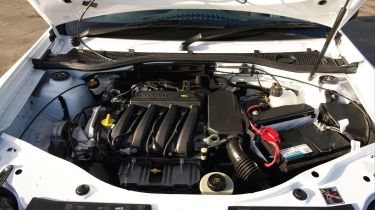Car engine noise explained: engine sounds you should worry about and those you shouldn't
Engine making an unusual noise? We help you determine whether it's time to visit the garage or not

When it comes to car ownership, few things are as unnerving as hearing an unusual noise from your engine. No car is completely silent – although the best electric cars come close – but certain sounds can indicate potential issues that shouldn’t be ignored.
In this article, we’ll walk you through the different engine noises to listen out for, what they might mean, and when you should be concerned – or not. If your car is making a noise but it’s not coming from under the bonnet, read our guides to exhaust noise and suspension noise.
Car engine noise: what’s normal?
Combustion engines have thousands of moving parts all moving simultaneously, so it’s natural for them to make some noise. Before diving into the noises you should worry about, let's cover what’s normal.
A healthy engine should produce a consistent, smooth hum. Depending on the car model and engine type, this hum might be a bit louder or quieter, but it should always be steady. You could also hear a faint ticking from the fuel injectors and a gentle whirring from the alternator and other accessories, but most modern cars are well insulated from the sounds.
When you first start your engine, you may hear a brief high-pitched squeal or rattle. This usually comes from the starter motor or the drive belt as the engine turns over. If it goes away after a few seconds, it’s typically nothing to worry about.
Car engine noises to be concerned about
If something goes wrong with your engine, there’s a good chance you’ll hear an unusual noise. Below, we’ve covered some of the most common worrying engine noises, their likely causes, and the best course of action.
1. Squealing or screeching noise
The most common cause of a squealing noise from your engine is a worn or loose belt. Belts are used to power your car’s accessories, including the alternator, power steering pump and air conditioning compressor. When a belt starts to wear out, it can slip, creating an unmistakable squealing sound. The same noise could also be caused by a misaligned belt or a faulty belt tensioner.
What to do: While a squealing belt is more annoying than dangerous in the short term, it should still be addressed as soon as possible. With prolonged driving, the belt could snap, leaving you without essential functions like power steering or even causing further damage to the engine. The fix is usually simple – either tightening the belt, realigning it, or replacing it altogether.
2. Hissing or whooshing noise
A hissing or whooshing noise typically indicates that something is leaking. In most cases, this will be an exhaust leak or an air leak from a vacuum line. Both could lead to engine performance issues, and possibly an engine warning light. More worryingly, a hissing noise could be a symptom of your engine overheating. If the hiss is accompanied by steam and you notice the engine temperature rising, you probably have a coolant leak. This could be from a hose, radiator, or even the water pump.
What to do: A vacuum leak or an exhaust leak should be rectified quickly, as they can impact fuel efficiency and overall engine performance. A mechanic should be able to identify where the leak is coming from and repair it fairly easily. If you suspect a coolant leak, pull over immediately and let the engine cool down before checking the coolant level. Driving with low coolant can cause the engine to overheat, leading to severe damage. This should be investigated by a professional.
3. Rattling or clattering noise
Light rattling noises often indicate that something under the bonnet is loose and vibrating. This could be as simple as a loose heat shield, exhaust system component, or engine cover. These issues, while irritating, are usually not critical.
However, a heavier, more pronounced rattling noise might suggest a more serious issue like a problem with the timing chain or valvetrain, which are crucial components for your engine’s operation. If you feel some vibration with a clattering noise, the engine mounts could have worn out, causing excess movement of the engine.
What to do: For minor rattles, you might be able to identify and fix the problem yourself, especially if it's something simple like tightening a loose bolt. However, if the rattling is loud or persistent, it's best to have it checked out by a mechanic. A worn engine mount probably won’t cause any immediate damage, but problems with the timing chain or valve train can lead to catastrophic engine failure if not addressed.
4. Sputtering, popping or rough engine noise
If you’ve noticed your engine sounds rougher or more irregular than normal, your engine could be misfiring. A misfire will usually be accompanied by an engine warning light, or even limp mode, as well as a decrease in performance. Misfiring occurs when fuel isn’t being burned correctly in one of the cylinders, causing the engine to sound rough or uneven. Your engine is designed to be balanced when all of the cylinders are working correctly, so a misfire will usually be accompanied by more vibration than normal.
You could also hear a pop or backfire – this is when fuel combusts outside the engine’s cylinders, typically in the exhaust system. This can happen for several reasons, including incorrect ignition timing, a rich fuel mixture, or a problem with the spark plugs.
What to do: A misfiring engine will need to be investigated by a professional, as there could be an issue with the spark plugs or ignition coils. Prolonged driving with a misfiring or backfiring engine can lead to expensive exhaust system damage.
5. Grinding noise
Sometimes what you think is an engine noise might actually be coming from your gearbox. A grinding noise when you change gear, particularly in a car with a manual gearbox, isn’t normal and means that something is probably worn out.
A grinding noise while changing gear typically points to a worn out clutch or synchroniser in the gearbox – this applies to cars fitted with a DSG automatic gearbox as well those with a manual gearbox. In traditional automatic cars, a similar noise could indicate a low level of gearbox fluid.
What to do: A noise from the gearbox is worth investigating right away. Grinding noises often signal the beginning of more serious problems, so it's crucial to have your vehicle checked by a professional as soon as possible. Ignoring the noise could lead to complete gearbox failure, which will be very expensive to repair or replace.
6. Engine knocking noise
One of the most worrying sounds you can hear is a knocking noise coming from the engine, but fortunately it’s not very common in modern cars. This sound is usually described as a rhythmic tapping or knocking, almost like someone is gently hitting the engine with a hammer.
Engine knocking is often caused by an issue with the fuel and air mixture inside your engine's cylinders. When this mixture doesn't combust at the right time, it can make a knocking sound. Common causes include carbon buildup inside the cylinders or a faulty knock sensor. A more severe knocking noise however may indicate problems with the crankshaft and connecting rods deep inside the engine. Often a result of insufficient lubrication – either due to low oil levels or blocked oil passages – it's effectively terminal, and may require a full engine rebuild.
What to do: If you hear knocking, don't ignore it. Continuing to drive with a knocking engine can lead to serious damage, so it’s worth visiting a mechanic as soon as possible. They may need to clean out the carbon deposits, replace the knock sensor, or investigate other potential causes.
7. Ticking or clicking
While a light ticking noise from your engine is normal, a more pronounced ticking noise could be caused by a lack of oil pressure or low oil level. If the components at the top of your engine – particularly the valvetrain – aren’t receiving enough lubrication, they can develop a ticking noise. This noise might also be more pronounced when the engine is cold and may diminish as it warms up.
What to do: You should start by checking your oil level. Low engine oil can cause all sorts of problems, including ticking noises. If the oil level is fine, but the ticking persists, you should have the engine inspected by a professional. While a ticking noise isn't immediately dangerous, it can indicate that your engine isn't getting proper lubrication, so it’s worth investigating.
If you ever find yourself unsure about a noise, it’s always better to err on the side of caution and have a professional take a look. Catching a problem early can save you a lot of time, money, and stress down the road.
More on car problems
Recommended

Classic car tax exemption: which historic vehicles qualify?
Most Popular

Omoda E5 targets rivals: now with zero deposit and APR

Ford Puma Gen-E driven: Electric charmer or too little, too late?
Tips & advice

Car dashboard warning lights: what does each symbol mean?

Electric car charging stations: public networks, charger types, apps and maps









